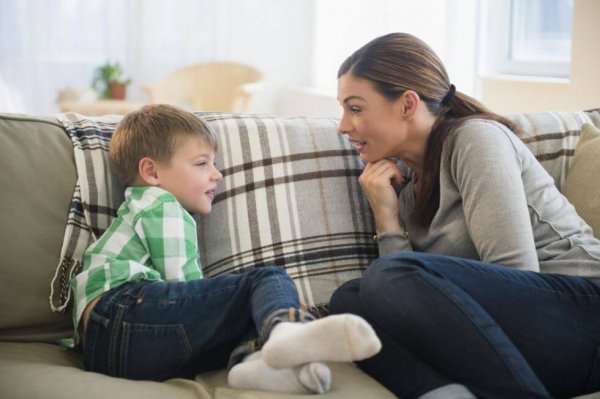To Consult with Your Kids on Everything is Not Democracy, It's Bad Parenting

Parenting has undergone a bad transformation during the last few decades. The structure of the family has also changed dramatically. It went from the pattern of considering children as chattel to children become the center of their parents universe.
Extended family has gradually disappeared. Now, most families have only one child, and many times only one parent as well. That is why the child becomes the center of attention of those primarily responsible for their parenting. This didn’t happen before, when the attention had to be spread among many children and other family members, such as aunts and uncles or grandparents, who also had a big influence on the parenting of the children.
“If you want children to keep their feet on the ground, put some responsibility on their shoulders.
-Abigail Van Buren
This new pattern is typical in middle and upper classes. That is why it has also resulted in something very disturbing, that children have also become a status symbol for their parents. They are a “big investment.” There is competition for who has the cutest children, more polyglot, more developed. Definitely more than any positive adjective we could think of.
Excessive attention on the children
The new pattern of parenting is an attempt to produce perfect children. It is characterized by constant supervision over what they do each day. But not only that, there is also complete supervision over their future. Their parents “design” a promising future from the time they start to walk.
So that they can meet these expectations, frequently, parents’ main objective is to make sure their children don’t have to face any problems. Getting into trouble does not fall in line with the plan, and much less learning how to get out of those problems without their parents help, without doing exactly the right thing.
On the other hand, parents have become very insecure. They fear their own authority. They turn into a sort of “coach” to their children. They project onto their children their own desires and goals and they are afraid of conflict with their children: they don’t want their disapproval of some action to affect them greatly. That is why they think about it extensively before setting limits.
The children of today
This type of focused parenting does not appear to have very promising results. It tends to breed children who are insecure and unable to face difficulties and shortcomings. They don’t know how to act when they are no longer the center of the universe. At the same time, they don’t understand that to get something you have to work hard for it.
Children who are raised by this standard have the feeling that they are better than everyone else. However, at the same time, that perception fades and goes to the other extreme with overwhelming ease. All their “self-love” ends when they find themselves in a situation where everyone else fails to applaud their actions.

These children are good candidates for dependency. If they are at a crossroads, they will more than likely call their parents before trying to resolve the situation on their own. As adults, they feel that it is a sign of love for their mate to put up with all their quips without any criticism. Deep down, despite all the languages they have learned or all the skills they have developed, emotionally they are still defenseless children.
Asking the children’s opinion on everything
This new style of parenting creates huge problems of authority. The idea that at child is a “miniature adult” is harmful. Some parents feel that if they ask their child’s opinion on everything they will increase their autonomy, when in reality, the effect they achieve is completely opposite. A child of 5 to 10 years of age, in many aspects, has no idea what is best for him, and on the other hand, feels that to develop autonomy complete obedience is necessary.
The limits set by parents are not a means to thwart the freedom or development of their children. On the contrary, they are the reference points that will make the children feel that the world is a secure place; it gives them a range within which they can explore freely and without fear. They will also learn that reality evolves within already established parameters and that it is not the child who determines how the world functions, but rather, that it is the other way around.

The family is an institution of asymmetrical relationships. Its principal function is to accompany an individual in the process of cultural immersion, and to follow the path of that culture it is essential that we give up on certain impossible desires. For example, the desire of never losing, the desire that the whole world will bend to our will, and many more that are a seed in every human being.
Their time will come when they can try to change the world. But, while they are small, they have to live within the guidelines set by their parents. Contrary to what many insecure parents think, this process of setting limits for their children is the best way to invest in their future.
Parenting has undergone a bad transformation during the last few decades. The structure of the family has also changed dramatically. It went from the pattern of considering children as chattel to children become the center of their parents universe.
Extended family has gradually disappeared. Now, most families have only one child, and many times only one parent as well. That is why the child becomes the center of attention of those primarily responsible for their parenting. This didn’t happen before, when the attention had to be spread among many children and other family members, such as aunts and uncles or grandparents, who also had a big influence on the parenting of the children.
“If you want children to keep their feet on the ground, put some responsibility on their shoulders.
-Abigail Van Buren
This new pattern is typical in middle and upper classes. That is why it has also resulted in something very disturbing, that children have also become a status symbol for their parents. They are a “big investment.” There is competition for who has the cutest children, more polyglot, more developed. Definitely more than any positive adjective we could think of.
Excessive attention on the children
The new pattern of parenting is an attempt to produce perfect children. It is characterized by constant supervision over what they do each day. But not only that, there is also complete supervision over their future. Their parents “design” a promising future from the time they start to walk.
So that they can meet these expectations, frequently, parents’ main objective is to make sure their children don’t have to face any problems. Getting into trouble does not fall in line with the plan, and much less learning how to get out of those problems without their parents help, without doing exactly the right thing.
On the other hand, parents have become very insecure. They fear their own authority. They turn into a sort of “coach” to their children. They project onto their children their own desires and goals and they are afraid of conflict with their children: they don’t want their disapproval of some action to affect them greatly. That is why they think about it extensively before setting limits.
The children of today
This type of focused parenting does not appear to have very promising results. It tends to breed children who are insecure and unable to face difficulties and shortcomings. They don’t know how to act when they are no longer the center of the universe. At the same time, they don’t understand that to get something you have to work hard for it.
Children who are raised by this standard have the feeling that they are better than everyone else. However, at the same time, that perception fades and goes to the other extreme with overwhelming ease. All their “self-love” ends when they find themselves in a situation where everyone else fails to applaud their actions.

These children are good candidates for dependency. If they are at a crossroads, they will more than likely call their parents before trying to resolve the situation on their own. As adults, they feel that it is a sign of love for their mate to put up with all their quips without any criticism. Deep down, despite all the languages they have learned or all the skills they have developed, emotionally they are still defenseless children.
Asking the children’s opinion on everything
This new style of parenting creates huge problems of authority. The idea that at child is a “miniature adult” is harmful. Some parents feel that if they ask their child’s opinion on everything they will increase their autonomy, when in reality, the effect they achieve is completely opposite. A child of 5 to 10 years of age, in many aspects, has no idea what is best for him, and on the other hand, feels that to develop autonomy complete obedience is necessary.
The limits set by parents are not a means to thwart the freedom or development of their children. On the contrary, they are the reference points that will make the children feel that the world is a secure place; it gives them a range within which they can explore freely and without fear. They will also learn that reality evolves within already established parameters and that it is not the child who determines how the world functions, but rather, that it is the other way around.

The family is an institution of asymmetrical relationships. Its principal function is to accompany an individual in the process of cultural immersion, and to follow the path of that culture it is essential that we give up on certain impossible desires. For example, the desire of never losing, the desire that the whole world will bend to our will, and many more that are a seed in every human being.
Their time will come when they can try to change the world. But, while they are small, they have to live within the guidelines set by their parents. Contrary to what many insecure parents think, this process of setting limits for their children is the best way to invest in their future.
This text is provided for informational purposes only and does not replace consultation with a professional. If in doubt, consult your specialist.







